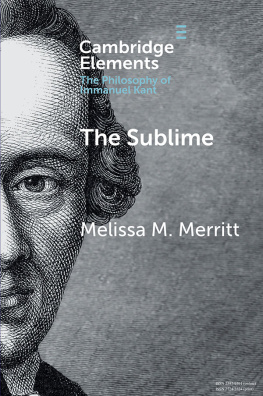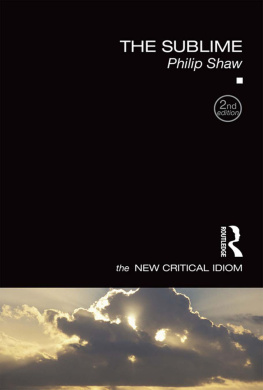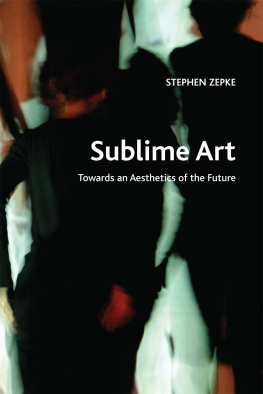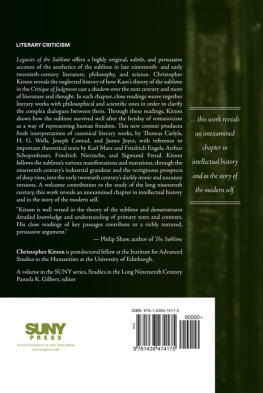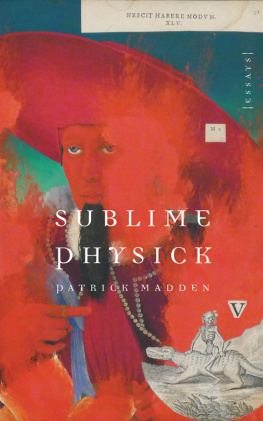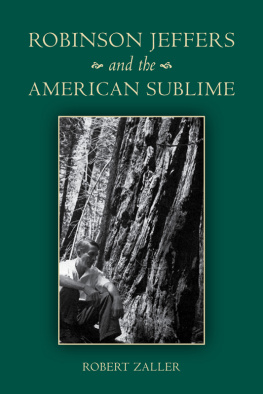Contents
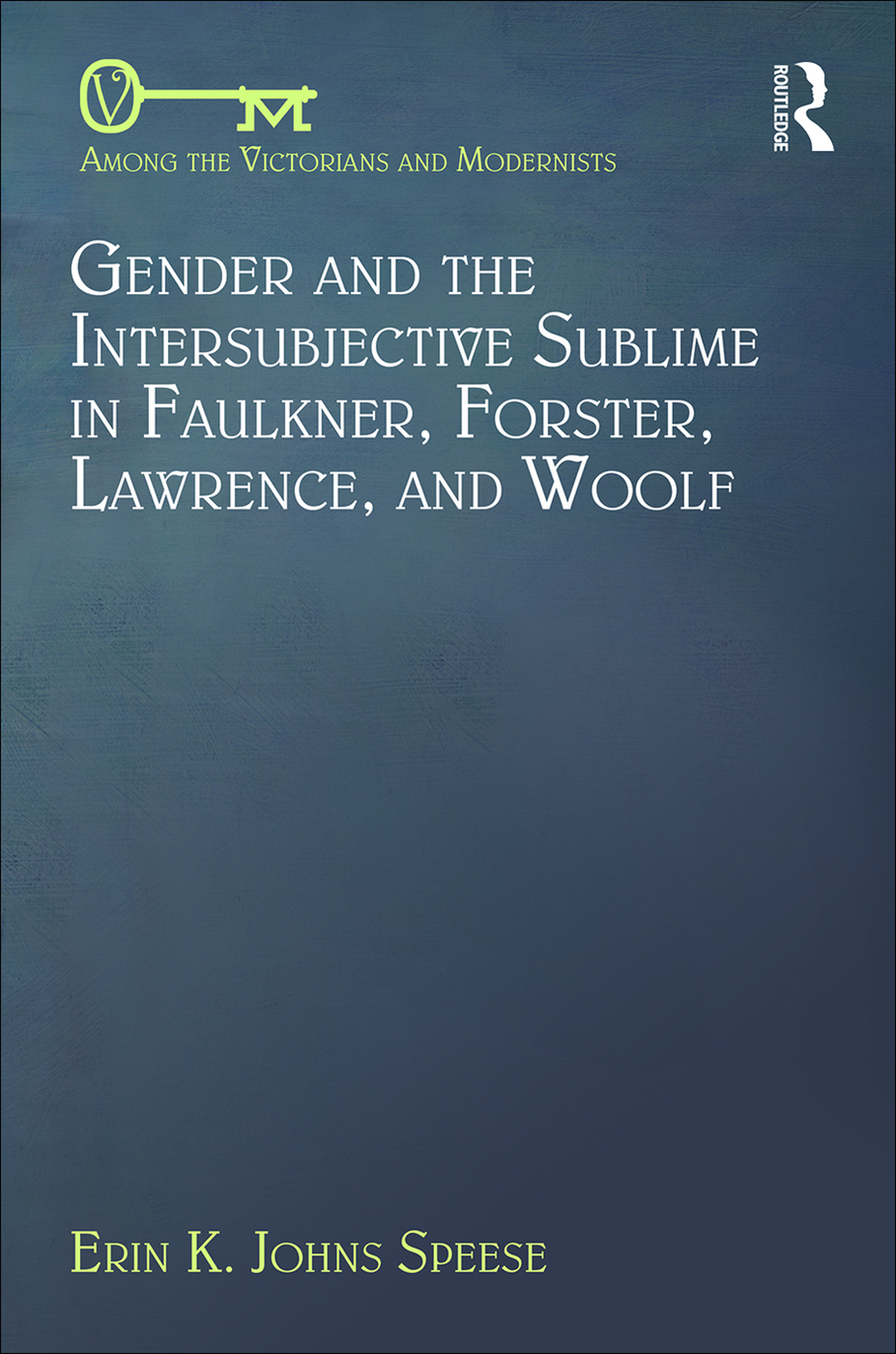
Gender and the Intersubjective Sublime in Faulkner, Forster, Lawrence, and Woolf
Exploring how the modern novels complex depictions of parenthood restructure traditional conceptions of the Romantic sublime, Erin K. Johns Speese shows how William Faulkner, E.M. Forster, D.H. Lawrence, and Virginia Woolf use related strategies to rewrite the traditional sublime as an intersubjective experience. Speese shows that this reframing depends on the recognition of social objectification and an ethics of reciprocal empathy between mothers and fathers. She juxtaposes traditional aesthetics and Slavoj ieks concept of the sublime object of ideology with recent theoretical work regarding identity, arguing that these modern novelists construct what she terms a sublime subject, that is, a person who functions in the space of the traditional sublime object. In revealing the possibility of transcendent emotional connection over reason, these novelists critique the objectification of the other in favor of a sublime experience that reveals the subject-shattering power of empathy.
Erin K. Johns Speese is a Visiting Assistant Professor at Duquesne University, USA.
Among the Victorians and Modernists
Edited by Dennis Denisoff
This series publishes monographs and essay collections on literature, art, and culture in the context of the diverse aesthetic, political, social, technological, and scientific innovations that arose among the Victorians and Modernists. Viable topics include, but are not limited to, artistic and cultural debates and movements; influential figures and communities; and agitations and developments regarding subjects such as animals, commodification, decadence, degeneracy, democracy, desire, ecology, gender, nationalism, the paranormal, performance, public art, sex, socialism, spiritualities, transnationalism, and the urban. Studies that address continuities between the Victorians and Modernists are welcome. Work on recent responses to the periods such as Neo-Victorian novels, graphic novels, and film will also be considered.
1 Arthur OShaughnessy, A Pre-Raphaelite Poet in the British Museum
Jordan Kistler
2 Dialectics of Secrecy and Disclosure in Victorian Fiction
Leila May
3 Louise Jopling
Patricia de Montfort
4 Gender and the Intersubjective Sublime in Faulkner, Forster, Lawrence, and Woolf
Erin K. Johns Speese
First published 2018
by Routledge
2 Park Square, Milton Park, Abingdon, Oxon OX14 4RN
and by Routledge
711 Third Avenue, New York, NY 10017
Routledge is an imprint of the Taylor & Francis Group, an informa business
2018 Erin K. Johns Speese
The right of Erin K. Johns Speese to be identified as author of this work has been asserted by her in accordance with sections 77 and 78 of the Copyright, Designs and Patents Act 1988.
All rights reserved. No part of this book may be reprinted or reproduced or utilised in any form or by any electronic, mechanical, or other means, now known or hereafter invented, including photocopying and recording, or in any information storage or retrieval system, without permission in writing from the publishers.
Trademark notice: Product or corporate names may be trademarks or registered trademarks, and are used only for identification and explanation without intent to infringe.
British Library Cataloguing-in-Publication Data
A catalogue record for this book is available from the British Library
Library of Congress Cataloging-in-Publication Data
Names: Johns Speese, Erin K., author.
Title: Gender and the intersubjective sublime in Faulkner, Forster, Lawrence, and Woolf / by Erin K. Johns Speese.
Description: New York : Routledge, 2017. | Series: Among the Victorians and modernists; 4 | Includes bibliographical references and index.
Identifiers: LCCN 2017027222 | ISBN 9781472480392 (alk. paper)
Subjects: LCSH: Mothers in literature. | Sublime, The, in literature. | English fiction20th centuryHistory and criticism. | American fiction20th centuryHistory and criticism.
Classification: LCC PR888.M69 J64 2017 | DDC 823/.91209dc23
LC record available at https://lccn.loc.gov/2017027222
ISBN: 978-1-4724-8039-2 (hbk)
ISBN: 978-1-315-58398-3 (ebk)
Typeset in Sabon
by codeMantra
For the late Richard Tobias,
who first gave me the sublime
I would first like to thank my dissertation director, Lisa Weihman, for her unwavering faith in my ability to succeed at writing this project. Her thoughtful feedback and enthusiasm was pivotal to this projects success. I would also like to thank the members of my dissertation committee: Gwen Bergner, for always pushing me to do better, Adam Komisaruk, for being willing to contemplate the complexities of the sublime with me, Ryan Claycomb, for giving me the inspiration to turn my dissertation into a book, and Lisa Rado, for encouraging my understanding of the connections between the sublime and modernism.
I would also like to thank Andrea Bebell, Teresa Pershing, and Jessica Queener without whose friendship and support, the dissertation would have been much more stressful. Also, thanks to Ann Amicucci, who was always only a phone call away, pushing me toward finishing my research goals.
Finally, I would like to extend my thanks to my mother and father, Carla and Richard Johns, and my brother, Alex Johns, for supporting me, even when I decided to pursue a PhD in English. And also, to my husband, Michael Speese, who always believed I could do this, and to my two children, Stella and Desmond, whom I hope to show that hard work really does matter.
Extracts from The Study of Thomas Hardy and Other Essays, and Reflections on the Death of a Porcupine by D.H. Lawrence reprinted by permission of Pollinger Ltd (www.pollingerltd.com) on behalf of the Estate of Frieda Lawrence Ravagli.
Excerpts from Collected Essays, Volume I by Virginia Woolf. Copyright 1966 by Leonard Woolf and renewed 1994 by M.T. Parsons. Reprinted by permission of Houghton Mifflin Harcourt Publishing Company. All rights reserved.
Excerpt from William Faulkner, The Art of Fiction No. 12, interview by Jean Stein, originally published in The Paris Review, Issue 12, Spring 1956. Copyright 1956 by The Paris Review, used by permission of The Wylie Agency LLC.
Extracts from Essays, Speeches, and Public Letters by William Faulkner reprinted by permission of Penguin Random House LLC.
Empathy. With increasing gun violence, the rise of social media, and a larger cultural awareness of bullying, the buzz-worthy word empathy identifies a pivotal need in our increasingly desensitized society. In the last few years, The New School for Social Research and the (Canadian) National Reading Campaigns articles on the link between empathy and early childhood reading surfaced in social media and the blogosphere, indicating that one of the best ways for a child to develop empathetic behavior is reading literature. Culturally, there has been a noticeable uptick in attention to how we interact with others and the importance of emotion in an increasingly desensitized society. Currently, there is growing anxiety regarding this issue, but if we look to the past, we will see that many intellectuals in the early twentieth century had a similar reaction to the popularity of salacious newspaper articles that they thought contributed to the destruction of society. Although that desensitization at the time related to anxieties about the decline of an elite class, especially as it concerned the reception and perception of art, in the early twenty-first century, the callousness of individuals is still attributed to the rise of mediaalbeit in other, more visual forms like television, movies, the internet, and video games. Still, the anxiety is one and the same: a concern about the decline of emotional response in a seemingly unaware audience.


